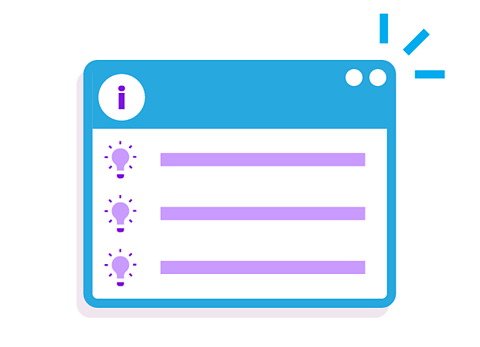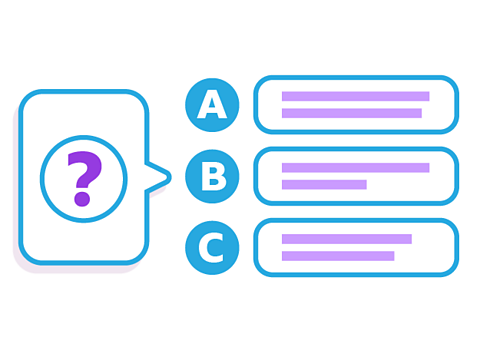Key points about the verb 'to be' in Spanish

The verbs Sorry, something went wrongCheck your connection, refresh the page and try again. and Sorry, something went wrongCheck your connection, refresh the page and try again. both mean 'to be'.
Ser is used with permanent things.
Estar is used with temporary things.
Adjectives can change their meaning according to whether ser or estar is used.
Video - The verb 'to be' in Spanish
Watch the video below to learn how to use the verbs ser and estar.
The verbs 'ser' and 'estar' are used in different ways
The verb 'to be' in Spanish.
In Spanish, there are two verbs for āto beā: ser and estar and you use them for different things.
The verb ser goes like this:
soy - I am
eres - you are
es - he/she/it is
You can use it for describing people: soy alto (āIām tallā) or es deportiva (āshe is sportyā).
You can also use ser if you're talking about where you or someone else is from.
ĀæDe dĆ³nde eres? - Where are you from?
Soy de EspaƱa - Iām from Spain.
And to talk about what you do: soy estudiante - Iām a student.
Mi padre es enfermero - My dad is a nurse.
Then thereās estar, the other Spanish verb for āto beā:
estoy - I am
±š²õ³ŁĆ”²õ - you are
±š²õ³ŁĆ” - he/she/it is
You can use estar to talk about feelings:
How are you? - ĀæCĆ³mo ±š²õ³ŁĆ”²õ?
Estoy feliz - Iām happy.
Or to talk about where people or things are located.
Estoy en Londres - Iām in London.
Excuse me, where is the cinema? - Perdona, ĀædĆ³nde ±š²õ³ŁĆ” el cine?
You can also use it to talk about the condition something or someone is in:
My phone is broken - Mi mĆ³vil ±š²õ³ŁĆ” roto.
Those are the main differences between ser and estar so itās great to know which one you need when!
How to conjugate 'ser' and 'estar'
The two verbs are conjugated verbA verb that is not in the infinitive form but has been changed to match the subject of the verb, for example I go, he goes. as follows:
| Sorry, something went wrongCheck your connection, refresh the page and try again. - to be | Sorry, something went wrongCheck your connection, refresh the page and try again. - to be |
|---|---|
| Sorry, something went wrongCheck your connection, refresh the page and try again. - I am | Sorry, something went wrongCheck your connection, refresh the page and try again. - I am |
| Sorry, something went wrongCheck your connection, refresh the page and try again. - you are | Sorry, something went wrongCheck your connection, refresh the page and try again. - you are |
| Sorry, something went wrongCheck your connection, refresh the page and try again. - he/she is | Sorry, something went wrongCheck your connection, refresh the page and try again. - he/she is |
| Sorry, something went wrongCheck your connection, refresh the page and try again. - we are | Sorry, something went wrongCheck your connection, refresh the page and try again. - we are |
| Sorry, something went wrongCheck your connection, refresh the page and try again. - you (plural) are | Sorry, something went wrongCheck your connection, refresh the page and try again. - you (plural) are) |
| Sorry, something went wrongCheck your connection, refresh the page and try again. - they are | Sorry, something went wrongCheck your connection, refresh the page and try again. - they are |
When to use 'ser'
The verb ser (to be) should be used for permanent things.
- Talking about nationalities
For example:
Somos galeses. - We are Welsh.
- Saying someoneās name or say who someone is in relation to you
For example:
Julia es mi hermana. - Julia is my sister.
- Talking about someoneās job
For example:
Mis madre es enfermera. - My mum is a nurse.
- Describing the physical characteristics of a person or thing
For example:
Soy alto - Iām tall.
- Describing someoneās personality
For example:
Eres muy amable. - Youāre very kind.
When to use 'estar'
Estar also means āto beā and is used when talking about temporary things and locations.
- Talking about things that might change in the future
For example:
Estoy enferma. - Iām ill.
EstĆ” triste hoy. - Heās sad today.
- Talking about where someone or something is
For example:
Mi casa ±š²õ³ŁĆ” enfrente del cine. - My house is opposite the cinema.
Estamos en casa. - Weāre at home.
The verb 'to be' in Spanish - Mini quiz

Fill in the gap to complete this sentence:
______ en Escocia.
We are in Scotland.
Estamos en Escocia.
Use estar as the sentence describes a location.
Fill in the gap to complete this sentence:
Sus ojos ___ azules.
His eyes are blue.
Sus ojos son azules.
Use ser as eye colour describes someoneās physical characteristics.
Adjectives with 'ser' and 'estar'
Some adjectives can change their meaning depending on whether ser or estar is used with them. Here are some common ones with both meanings:
| Adjective | Ser meaning | Ser example | Estar meaning | Estar example |
|---|---|---|---|---|
| Sorry, something went wrongCheck your connection, refresh the page and try again. | clever, intelligent | Es listo. (He is clever.) | ready | EstĆ” listo. (He is ready.) |
| Sorry, something went wrongCheck your connection, refresh the page and try again. | good | Jorge es bueno. (Jorge is good.) | Attractive | Jorge ±š²õ³ŁĆ” bueno. (Jorge is attractive.) |
| Sorry, something went wrongCheck your connection, refresh the page and try again. | boring | Elena es aburrida. (Elena is boring.) | bored | Elena ±š²õ³ŁĆ” aburrida. (Elena is bored.) |
| Sorry, something went wrongCheck your connection, refresh the page and try again. | bad | Antonio es malo. (Antonio is bad.) | ill | Antonio ±š²õ³ŁĆ” malo. (Antonio is ill.) |
| Sorry, something went wrongCheck your connection, refresh the page and try again. | rich | El rey es muy rico. (The king is very rich.) | tasty | La comida ±š²õ³ŁĆ” rica. (The food is tasty.) |
| Sorry, something went wrongCheck your connection, refresh the page and try again. | safe | AquĆ estoy segura. (Here Iām safe.) | sure | No estoy segura de si me gusta. (Iām not sure if I like it.) |
Quiz - The verb 'to be' in Spanish
Practise what you've learned about the verb 'to be' with this quiz.
Higher Tier - The adjective 'pesado' with 'ser' and 'estar'
The adjective pesado changes its meaning depending on whether it is used with ser or estar
| Adjective | Ser meaning | Ser example | Estar meaning | Estar example |
|---|---|---|---|---|
| Sorry, something went wrongCheck your connection, refresh the page and try again. | boring | El libro es pasado. (The book is boring.) | heavy | EstĆ” bastante pesado. (Itās quite heavy.) |
Now you have learned about the verb 'to be' in Spanish why not explore infinitives in Spanish?
More on Present tense verbs
Find out more by working through a topic
- count6 of 10

- count7 of 10

- count9 of 10
